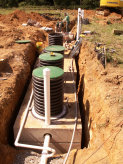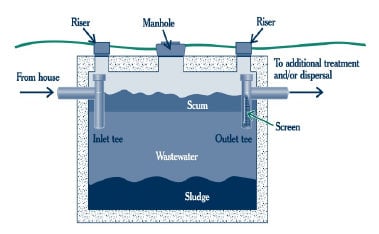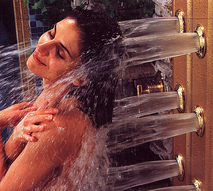Maintenance and Management


Proper maintenance and management is an effective program developed to monitor, inspect and maintain all components of the septic system on a regular basis. Regular and proper cleaning is one way to help prolong your onlot sewage system. Make sure that the pumper opens the main access of the septic tank when cleaning it out. This allows the tank to be completely cleaned out. Never pump the tank through the 4 or 6" inspection port that is situated over the baffles. Only a small portion of the tank will be cleaned and risk of damaging the baffles inside the tank is high. Inspect the condition of the baffles. If missing, broken, damaged, or deteriorated, they should be replaced immediately. They serve an important purpose in helping to prolong the life of your system.
When the sludge and scum layers are not routinely pumped out, the area in the tank available for clarification decreases. Solids will enter the absorption area at an accelerated rate, and the absorption area clogs prematurely. Effluent forms over the absorption area onto the surface of the ground. Sewage finds its way to a stream or road ditch, or backs up into your home.
Water Conservation:

Water conservation is and important factor in prolonging the life of any onsite disposal system. Reducing the amount of water used in the home decreases the volume of wastewater that must be renovated and helps to avoid hydraulic overload of the system. In addition, water conservation reduces energy costs and protects the groundwater supply.
Some things you can do to conserve water are:
- Install water saving plumbing fixtures in you home. Theses would include water dams for toilets, water saver aerators on faucets and water saving shower heads. Most building codes require that all new construction have these water saving devices routinely installed.
- Check your toilets periodically for leaks. This can be done quite easily. Place a few drops of food coloring in the toilet tank. Do not flush the toilet for several hours. If the colored water appears in the toilet bowl during this time, your toilet is leaking. Have it fixed immediately.
- Fix leaking faucets.
- Operate the dishwasher only when full. Do not pre-wash dishes for the automatic dishwasher unless absolutely necessary. Wash dishes using a dishpan or plugging the sink. Do not let water run for washing.
- Refrigerate a bottle of water for drinking to avoid letting the water run to obtain a cold drink.
- Select the proper load or water level on your washing machine. Do not wash multiple loads of laundry, one right after the other.
- Take a shower instead of a tub bath. Also try to limit the length of your showers.
- Do not allow the water to run while brushing teeth or shaving.
Hazards To Your Onlot Sewage System
Contractors should pump the treatment tank through the main access, not the inspection port.
- Do not clean paint from rollers or dispose thinners down the drain.
- Do not flush large numbers of unused antibiotics.
- Materials that do not rapidly decompose (e.g., sanitary napkins, coffee grounds, bones, eggshells, wet strength towels, disposable diapers, kitty litter, facial tissues, cigarette butts, baby wipes, etc.) should never be flushed into a septic tank.
- Do not use garbage disposals. Garbage disposals increase a treatment tank's workload. The increased organic solids load requires more frequent tank pumping.
- Do not dispose oils and grease products.
Do You Have Any Good Tips?
Post them here under comments!
